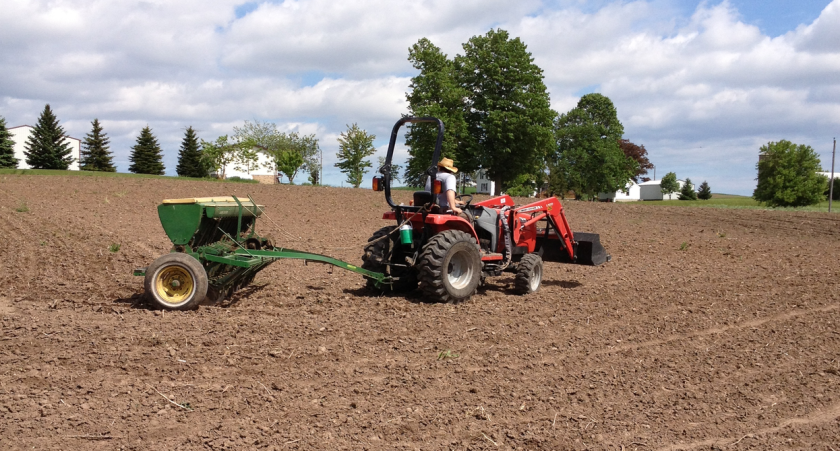 One trend in agriculture has been making me nervous for some time now, and that is how large quantities of farmland are being concentrated in the hands of fewer and fewer people.
One trend in agriculture has been making me nervous for some time now, and that is how large quantities of farmland are being concentrated in the hands of fewer and fewer people.
This has been going on for some time, of course. When I was a kid the road we lived on was dotted with small farms of various sizes ranging about 80 acres to 150 acres or so. Ours was actually one of the larger ones when I was a kid, with 140 acres and about 120 under cultivation. If memory serves me correctly, there were ten or twelve farms just on that one stretch of road when I was a kid. Today the houses and even many of the barns are still standing, but they aren’t farms any more, they’re residences. The actual farmland is now owned by one of three huge farming operations.
Whether or not this is a “good thing” is open to debate. But there is one trend that I think is definitely not a good thing, and that is that large amounts of farmland is being snapped up by investment companies.
Corporations like Farmland Partners (which doesn’t actually do any farming) and a lot of others, located both in the US and in other countries, are buying up farmland wherever they can find it and then renting it back to real farmers. For, of course, a profit
One can understand their point of view. People have to eat, after all. Therefore there is always going to be demand for land on which to grow crops. If a farmer can’t afford to buy land, he or she has to get it from somewhere, so they’re forced to rent it from a land owner. To an investor this seems like a fairly safe type of investment, especially with the stock markets being as volatile as they are.
But for farmers, for agriculture in general, this practice is disturbing in more than one way and is potentially damaging for consumers, farmers and agribusiness in general.
These companies do no farming, grow no crops, harvest no grain, raise no cattle. They do nothing to improve the quality of the land they own. They exist for only one reason, to rent land back to real farmers for the maximum amount of money they can squeeze out of them. They contribute nothing to agriculture. I dislike the term ‘parasite’, but, well… Isn’t that what you call an entity which does nothing but syphon off the resources of others and provides no benefit to those it feeds off of?
So far these companies have had little adverse effect on agriculture. Up until now they have been picking off the ‘low hanging fruit’, so to speak, snapping up deals here and there, in widely scattered areas. But as they acquire more, as more farmland is taken out of the control of farmers and placed in the hands of a few companies that care only for making profit… Well, the potential for abuse is obvious.
This kind of thing is legal. I certainly can understand the attraction people may have for this kind of an investment. With the stock market going through endless series of boom/bust cycles over the last few decades, a fairly stable investment like farmland is certainly attractive.
But what kind of effect is this going to have on agriculture as ever increasing amounts of land are being held in perpetuity by companies whose only goal is to squeeze as much profit out of farmers as possible?

This appears to be an action in agricultural colonization…..absentee landlords? How’d that work for the Irish? It is certainly about corporate control and has nothing to do with the good will of feeding people. Thanks for sharing this, excellent article.
LikeLike
Absentee landlord is a very good term for this, and this has all of the same potential for abuse. What especially irritates me is that these corporations are really contributing nothing to agriculture at all. They drive up prices for real farmers who are trying to get in the business, add to the farmer’s expenses, and add no actual value to the whole system except for the few investors in the corporation.
LikeLike
You are spot on. So many layers to this issue and the future of good farming…the growing of safe and healthy food. The impact it has on rural communities….dismantling them really. I know colonization refers to indigenous peoples and the entities that oust them, but a farmers relationship to the land, the community, and this way of life ( farming), implies an indigenous nature. Have you seen the film, SEED, The Untold Story? You can read a brief overview on our blog (fernwoodnursery.wordpress.com) Go to the search bar and type in the movie title. Great film! You may be interested in it. Thanks for sharing such wise words and thoughts.
Best to you, denise
LikeLike